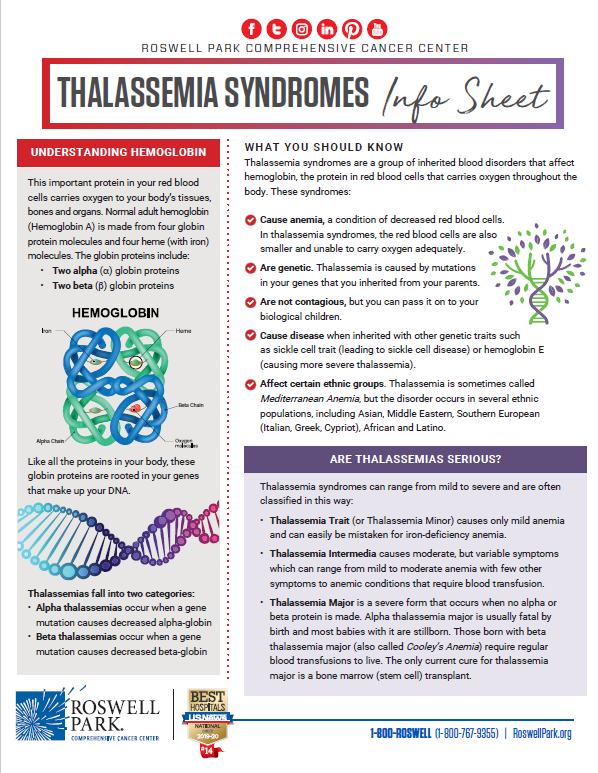What are thalassemia syndromes?
Thalassemia syndromes are a group of inherited blood disorders that affect hemoglobin, the protein in red blood cells that carries oxygen throughout the body. These syndromes:
- Cause anemia, a condition of decreased red blood cells. In thalassemia syndromes, the red blood cells are also smaller and unable to carry oxygen adequately.
- Are genetic. Thalassemia is caused by mutations in your genes that you inherited from your parents.
- Are not contagious, but you can pass it on to your biological children.
- Cause disease when inherited with other genetic traits such as sickle cell trait (leading to sickle cell disease) or hemoglobin E (causing more severe thalassemia).
- Affect certain ethnic groups. Thalassemia is sometimes called Mediterranean Anemia, but the disorder occurs in several ethnic populations, including Asian, Middle Eastern, Southern European (Italian, Greek, Cypriot), African and Latino.
Thalassemias fall into two categories: Alpha thalassemias occur when a gene mutation causes decreased alpha-globin. Beta thalassemias occur when a gene mutation causes decreased beta-globin.
How serious are thalassemias?
Thalassemia syndromes can range from mild to severe and are often classified in this way:
- Thalassemia Trait (or Thalassemia Minor) causes only mild anemia and can easily be mistaken for iron-deficiency anemia.
- Thalassemia Intermedia causes moderate, but variable symptoms which can range from mild to moderate anemia with few other symptoms to anemic conditions that require blood transfusion.
- Thalassemia Major is a severe form that occurs when no alpha or beta protein is made. Alpha thalassemia major is usually fatal by birth and most babies with it are stillborn. Those born with beta thalassemia major (also called Cooley’s Anemia) require regular blood transfusions to live. The only current cure for thalassemia major is a bone marrow (stem cell) transplant.
How is thalassemia treated?
Because thalassemia syndromes are so varied, what you can do to remain healthy depends on your type of thalassemia. Treatment may include:
- Genetic counseling to learn your risk for having children with thalassemia
- Careful monitoring of growth and development
- Assessment and management of iron overload
- Screening for complications of the disease
- Blood transfusions
Why Roswell Park?
The Sickle Cell & Hemoglobinopathy Center of WNY is the referral center for all newborns in Western and Central New York with thalassemias and other hemoglobin disorders. Our center provides:
- Experts in thalassemia and other childhood blood disorders
- Chronic transfusion therapy
- Medical and support team for children with thalassemias, including nurse practitioner, nurses, patient navigator, psychologists, social worker and other ancillary staff
- Bone marrow transplant options
